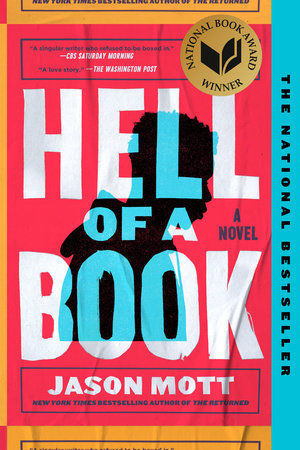READERS GUIDE
1. In Hell of a Book, The Author says, “I am, after all, not an activist . . . I’m a professional” (82). What do you think this character means by that? What do you think it means to write as an activist?
2. The police shooting of an unarmed Black boy is playing over and over on the news throughout the novel. Discuss how this aspect of the story makes you think about the way racism, injustice, and violence function in our society.
3. The Author says, “In this world that we live in, the fact of the matter is that it’s hard to think of anyone as being real” (98). Do you agree? How do so-cial media and screens mediate our experiences of others? How do they affect our ability to empathize or make connections? Think about this in regards to when you’ve seen videos of anti-Black violence or violence against diverse communities go viral.
4. According to The Author, his “pops was afraid. Always afraid. Every second of every day. His life was one long, sustained terror” (126). Why does The Author describe this fear as dan-gerous? What are the consequences of having to live in constant fear because of your skin color?
5. The Author struggles with whether or not to tell The Kid what it means to be Black in America, that he will be treated differently because of his skin. Discuss the questions he grapples with: “What kind of thing is that to tell a kid? What kind of moment does it create? What does it take away? What does it leave them with?” (206).
6. The Author was a kid who “belonged nowhere. And, because of it, most of his life, he felt like nothing” (250). What is the relationship between feeling a sense of belonging and self-esteem? How can community bolster one’s identity? What communities are part of your identity?
7. Soot imagines another world where he could love himself and the color of his skin, which he calls home. Discuss this conception of home and how imagination can make reality less painful. What role does imagination play in your own life?
8. In the world of this novel, reality and fiction have porous borders. How do they relate to each other? Have you ever felt like the lines were blurred between what is real and what is not?
9. Discuss why Soot’s parents wanted him to be able to become invisible. What do you think they see as the relationship between being unseen and safe? What does that coping mechanism say about society in a broader sense?
10. How do the perspectives of The Author, Soot, and the other characters work together, and how do they differ? How are their perspectives influenced by the way they are treated by American society?
11. What do you think about The Author’s struggle with facing reality? Discuss some of The Author’s ways of coping with problems and fears that sometimes feel insurmountable. Do you think that writing or reading can be a way of coping? What are some tactics you employ to cope with challenges in your own life?
12. When you first started reading, did you notice that Jason Mott didn’t name The Author? Why do you think he did that? Do you agree or disagree that naming something makes it more real?
13. Discuss the relationship The Author has with his agent and media trainer in the novel. Do you think they are offering good advice? How do you think being Black changes the way The Author experiences publishing a book?

